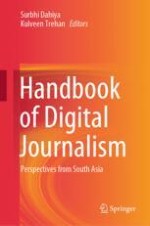2024 | OriginalPaper | Buchkapitel
38. Mobile Media Democratising Journalism in India: A Case Study of Chhattisgarh
verfasst von : Shubhranshu Choudhary
Erschienen in: Handbook of Digital Journalism
Verlag: Springer Nature Singapore
Aktivieren Sie unsere intelligente Suche, um passende Fachinhalte oder Patente zu finden.
Wählen Sie Textabschnitte aus um mit Künstlicher Intelligenz passenden Patente zu finden. powered by
Markieren Sie Textabschnitte, um KI-gestützt weitere passende Inhalte zu finden. powered by
